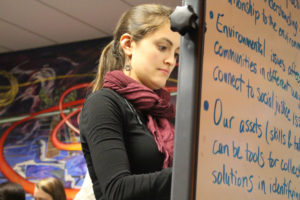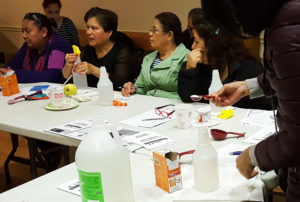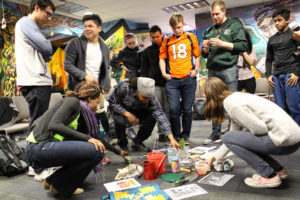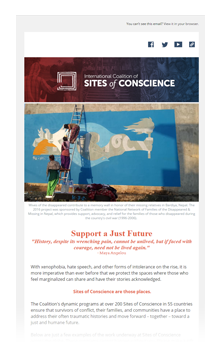The Rafael Cintrón Ortiz Latino Cultural Center (LCC) was established forty years ago at the University of Illinois at Chicago (UIC) out of an urban student struggle for educational equity. Thanks to generations of protest for more diverse recruitment, ethnically relevant courses and cultural centers, UIC has become a rare example of an institution of higher education with no ethnic majority – a significant achievement in Chicago, a city marked by divisions between race and class, both past and present. Today LCC uses arts and cultural programming to focus on contemporary issues affecting the lives of Latinos, while making connections to other communities, particularly through two issues: immigration and environmental/climate justice.
In 2015, LCC received a Project Support Fund grant from the Coalition to support the development of an Environmental and Climate Justice Dialogue Initiative to explore environmental and climate change issues from a cultural perspective. Below, Lena Guerrero Reynolds and Rosa M. Cabrera of LCC talk about the motivations behind the program and the positive impact it has had on its community.
How a Cultural Center in an Urban Public University
Approaches Climate Change
By Lena Guerrero Reynolds and Rosa M. Cabrera
“Traditions at home have a lot of power over the web of life.” – LCC visitor
The connection between the environment and culture may not be immediately obvious to
some, but social systems like poverty and power have enormous effects on the way people interact with the environment, and how climate change affects their lives from natural disasters to everyday food options. Cultural destruction often goes hand in hand with environmental destruction, from the rainforests of Peru to the gentrification of Chicago’s West Side, but there are solutions to be found in cultural values and practices to mitigate the impact of environmental degradation and climate change. It was this concept that brought LCC staff to create an Environmental and Climate Justice (ECJ) Dialogue Initiative, to connect people in the heart of Chicago with the global environmental and climate change challenges at hand, recognizing that each of us can play a part in creating solutions for the future.
The ECJ dialogues use storytelling as a way to share and break down assumptions about our identities and relationships to the environment. Perhaps Whole Foods and Tesla cars represent one side of the conversation, but the truth is that all cultures engage in some kind of environmentally friendly practices that are rarely acknowledged or elevated. ECJ Dialogue facilitators bring these to light by inviting participants to share stories about their own family practices through objects – such as paper fans, clotheslines or skateboards – that are displayed in the center of a dialogue circle.
 As diverse stories are shared and validated, facilitators begin to draw attention to the barriers that are mentioned – including cost, lack of education and time constraints – that might prevent people from engaging in more pro-environmental habits. Exploring the term “justice,” participants are invited to think further and recognize inequality as an essential component to any environmental and climate change discussion. On a local level, for instance, not all Chicago communities have access to parks or recreational resources, to transportation options or decent housing and job opportunities, to safe water and healthy food options. On the international scale, poor countries can expect to be more deeply affected by rising sea levels and scarce resources if climate change continues unabated.
As diverse stories are shared and validated, facilitators begin to draw attention to the barriers that are mentioned – including cost, lack of education and time constraints – that might prevent people from engaging in more pro-environmental habits. Exploring the term “justice,” participants are invited to think further and recognize inequality as an essential component to any environmental and climate change discussion. On a local level, for instance, not all Chicago communities have access to parks or recreational resources, to transportation options or decent housing and job opportunities, to safe water and healthy food options. On the international scale, poor countries can expect to be more deeply affected by rising sea levels and scarce resources if climate change continues unabated.
Participants are led to draw such connections between issues near and far, past and present, to understand how environmental and climate justice encompass many interrelated social, cultural and economic factors. In one dialogue, an African American and Mexican student both remarked on the way their parents were shamed out of hang-drying laundry when they arrived in the city from their divergent Southern departure points. In another session, participants compared the environmental effects of the 19th century Irish potato famine with the drought in Syria as causes for mass migration. Each dialogue is uniquely guided by the ideas participants bring to the table, and facilitators identify both similarities and differences between how communities experience these issues in order to gain broader understanding together.
Environment-friendly practices can easily be weighed down by the scope of challenges we face, so facilitators next shift towards identifying potential action steps. Returning to a list of participants’ assets shared as an activity at the beginning of the dialogue, facilitators point to diverse skills and talents in the room like “bilingual,” “good at networking,” “basketball” or “graphic design.” Participants are broken into small groups to come up with a collective project utilizing their assets for creating social change. In one dialogue, a group of high school students identified skills in math, cooking and gardening, so the team decided to address unhealthy food in their cafeteria by advocating for school farming to save money and educate fellow students.
Unique solutions have emerged from each dialogue session, including some that reference cultural heritage as an asset that can help address environmental and climate change challenges; and others that imagine larger-scale projects with a global impact. Forming coalitions across diverse identities – and recognizing that cultural diversity fuels greater human creativity – will allow us to find solutions to common challenges. Still, it will take a huge effort to address the challenges facing the planet and its diverse eco-systems. Museums and cultural centers have an important role in helping people honor, protect and harness our cultural diversity to shape a sustainable and just world.
To access the ECJ Dialogue Guide for Museums, Cultural Centers, and Historic Sites (pdf) go to: https://archive.sitesofconscience.org/wp-content/uploads/2016/08/2015-Environmental-Climate-Justice-Dialogue-Guide_Eng-LatinoCC.pdf

